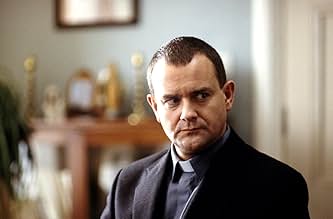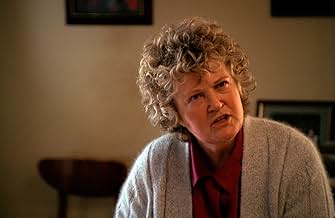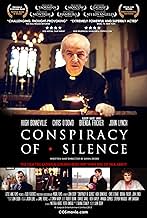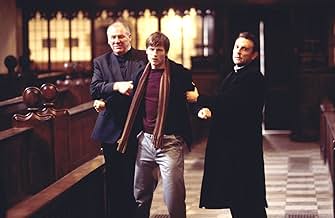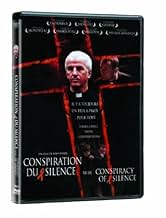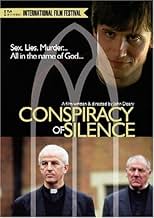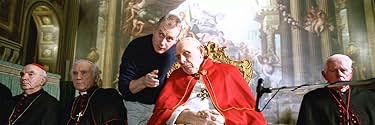Aggiungi una trama nella tua linguaA Catholic priest's suicide and seminarian's expulsion for homosexuality spark a local journalist's investigation, uncovering celibacy controversies and abuse cover-ups within the Irish Cath... Leggi tuttoA Catholic priest's suicide and seminarian's expulsion for homosexuality spark a local journalist's investigation, uncovering celibacy controversies and abuse cover-ups within the Irish Catholic church.A Catholic priest's suicide and seminarian's expulsion for homosexuality spark a local journalist's investigation, uncovering celibacy controversies and abuse cover-ups within the Irish Catholic church.
- Regia
- Sceneggiatura
- Star
- Premi
- 2 vittorie e 3 candidature totali
Padraig O'Loinsigh
- Father Sweeney
- (as Patrick Lynch)
Recensioni in evidenza
I was lucky enough to be invited to a cast screening of the film at the Empire in Leicester Square, (my dad has a small part - he sings the Wild Colonial Boy in a pub scene). I really enjoyed the film as it struck a number of chords with me having been brought up a Catholic, taught by priests and Irish (at least Irish descent). The film has the same well observed quality as Alan Parkers film of Roddy Doyle's The Committments. The topic is a serious one about Aids and Homosexuality in the Catholic Church but don't let that put you off, the film is full of funny interactions that are typically Irish and will appeal to many people. I didn't think that the message of the film was clear it covered the Church's attitude to aids, homosexuality, harshness of the regime in a seminar and corruption. So something for everyone. A well acted and entertaining film with a number of well known stars in fairly minor roles.
This is an interesting drama built on some questionable premises: 1. That many priests are HIV positive, and 2. That a good student would be summarily expelled from seminary because he visited another seminarian's room alone in the early evening. Premise #1 seems to me unlikely, especially in the United States, but in Ireland...who knows?
Premise #2 is the situation which sets this drama in motion, but it is almost unbelievable that this seminary would expel a student for possible but unproven sexual misconduct, when the whole culture of the seminary was to keep any such conduct, real or imagined, deeply buried in secrecy.
That said, the problem of clerical celibacy in the Catholic Church is explored and handled well. The actors are all credible and the film moves swiftly toward the final confrontation scene when all the secret sins are exposed. Then the film is suddenly over, leaving many unexplained plot strands dangling and unresolved.
Luckily the DVD contains sub-titles in English. You will need them to understand the swiftly-paced Irish brogue employed by the cast.
Premise #2 is the situation which sets this drama in motion, but it is almost unbelievable that this seminary would expel a student for possible but unproven sexual misconduct, when the whole culture of the seminary was to keep any such conduct, real or imagined, deeply buried in secrecy.
That said, the problem of clerical celibacy in the Catholic Church is explored and handled well. The actors are all credible and the film moves swiftly toward the final confrontation scene when all the secret sins are exposed. Then the film is suddenly over, leaving many unexplained plot strands dangling and unresolved.
Luckily the DVD contains sub-titles in English. You will need them to understand the swiftly-paced Irish brogue employed by the cast.
In the last decade or two a lot of news has come out about the Catholic Church's cover-up of pedophilia. John Deery's "Conspiracy of Silence" isn't about that but about something similar: the church's policy of celibacy. In this case, the suicide of a gay priest living with HIV and the expulsion of some students suspected of a same-sex relationship prompt an article questioning the rightness of the church's celibacy policy.
It seems very likely that forcing priests to be celibate increases the risk of the priests' molesting children. Relationships are natural among all species, and not letting people be in relationships can only damage them. This is not to be confused with pedophilia, which is a disease. But either way, the Catholic Church has had a history of suppressing all news of the molestations, as well as a history of homophobia.
"Conspiracy of Silence" isn't a great movie but does a good job looking at these different topics. It's all the more impressive considering that the director was a first timer. I recommend it.
It seems very likely that forcing priests to be celibate increases the risk of the priests' molesting children. Relationships are natural among all species, and not letting people be in relationships can only damage them. This is not to be confused with pedophilia, which is a disease. But either way, the Catholic Church has had a history of suppressing all news of the molestations, as well as a history of homophobia.
"Conspiracy of Silence" isn't a great movie but does a good job looking at these different topics. It's all the more impressive considering that the director was a first timer. I recommend it.
First of all, I would like to comment on that review that characterized the maker of this movie as "a devout Catholic." Perhaps he is, but you'd never know it from this movie. Authority and obedience are portrayed as outdated and inflexible rituals rather than, as the Church teaches, a MEANS to the end: a moral life and therefore a good death. No, in this puff piece, "rights" and revolt are the safeguards of Christian moral teachings.
It's a real shame, too, because I was really hopeful that someone had finally done a piece about the general crisis in the priesthood without either whitewashing the depth and the gravity of the problem (as do most so-called "conservative" dupes) or calling for a radicalization of immutable Catholic doctrine and its underlying philosophy (as pretty much every run-of-the-mill left-liberal idiot in the "mainstream" media has done). There have been many bishops who have abused their authority and many priests who have done terrible things. And there is a serious accountability problem.
It's also a shame that a film with such high production value - very good directing and acting - had a script that falls back time and again on salacious voyeurism and trite contemporary banalities such as "I have a right to be here!" But there is one good didactic thing to take away from that moment. For a Catholic, to see a young seminarian protest so and then his seminary director reply coldly, "Not in here, you don't" is as much a sad reflection of the failing of the director as it is a pathetic portrait of the young man's effeminacy: why did the director not make it a point to emphasize the virtue of obedience to his seminarians first thing and thereby avoid having to hear them spit out such false nonsense? Why and how did he fail to establish a relationship of trust with them? The film never explores those questions.
And please, before anyone tries to give me the answer I think you're thinking, let me ask: how would "change" in the Church, through a more "liberal" and "democratic" ecclesiastical government, make the people more trusting of Church leaders? (Consider that the democratically elected U.S. Congress is one of the least-respected institutions in its country.)
It's a real shame, too, because I was really hopeful that someone had finally done a piece about the general crisis in the priesthood without either whitewashing the depth and the gravity of the problem (as do most so-called "conservative" dupes) or calling for a radicalization of immutable Catholic doctrine and its underlying philosophy (as pretty much every run-of-the-mill left-liberal idiot in the "mainstream" media has done). There have been many bishops who have abused their authority and many priests who have done terrible things. And there is a serious accountability problem.
It's also a shame that a film with such high production value - very good directing and acting - had a script that falls back time and again on salacious voyeurism and trite contemporary banalities such as "I have a right to be here!" But there is one good didactic thing to take away from that moment. For a Catholic, to see a young seminarian protest so and then his seminary director reply coldly, "Not in here, you don't" is as much a sad reflection of the failing of the director as it is a pathetic portrait of the young man's effeminacy: why did the director not make it a point to emphasize the virtue of obedience to his seminarians first thing and thereby avoid having to hear them spit out such false nonsense? Why and how did he fail to establish a relationship of trust with them? The film never explores those questions.
And please, before anyone tries to give me the answer I think you're thinking, let me ask: how would "change" in the Church, through a more "liberal" and "democratic" ecclesiastical government, make the people more trusting of Church leaders? (Consider that the democratically elected U.S. Congress is one of the least-respected institutions in its country.)
Watched this film in 2010 on DVD on a rainy Friday evening in October - so this was ideal although sombre entertainment.
The film has a reasonably fast pace, a simple story line - a little preachy in its anti-celibacy message, but overall worthwhile, although the ending is a bit implausible.
It seems somewhat unrealistic that a seminary in today's Ireland would still exist with more than half a dozen trainees, and hard to believe that with such low numbers that they would so quickly expel a trainee without evidence. The film was made in 2003 before the onslaught of the fallout of the Catholic-Church-Protects-Paedophiles scandals, and to see the movie again in the knowledge of such events gives an added frisson - "the church is killing itself from the inside" is one of the quotes from the film.
The storyline involves celibate priests that are gay - it could just as easily have portrayed priests or bishops that have one or more children - but perhaps the movie had an agenda that was more than just anti-celibacy but also against the anti-gay homophobic nature of the roman-catholic hierarchy.
The film shows a statistic about 100,000 priests having quit because of the celibacy rule - but does'not show the numbers of priests in non-catholic Christian traditions who can marry but still leave their ministries anyway.
For a non-Irish audience some of the accents are difficult, and my DVD did not have a sub-title track for some reason.
A worthy film, if a little flawed, hope to see more from this director.
The film has a reasonably fast pace, a simple story line - a little preachy in its anti-celibacy message, but overall worthwhile, although the ending is a bit implausible.
It seems somewhat unrealistic that a seminary in today's Ireland would still exist with more than half a dozen trainees, and hard to believe that with such low numbers that they would so quickly expel a trainee without evidence. The film was made in 2003 before the onslaught of the fallout of the Catholic-Church-Protects-Paedophiles scandals, and to see the movie again in the knowledge of such events gives an added frisson - "the church is killing itself from the inside" is one of the quotes from the film.
The storyline involves celibate priests that are gay - it could just as easily have portrayed priests or bishops that have one or more children - but perhaps the movie had an agenda that was more than just anti-celibacy but also against the anti-gay homophobic nature of the roman-catholic hierarchy.
The film shows a statistic about 100,000 priests having quit because of the celibacy rule - but does'not show the numbers of priests in non-catholic Christian traditions who can marry but still leave their ministries anyway.
For a non-Irish audience some of the accents are difficult, and my DVD did not have a sub-title track for some reason.
A worthy film, if a little flawed, hope to see more from this director.
Lo sapevi?
- QuizThe team sport discussed and then played in the early part of the film is Hurling. Hurling (Irish: Iománaíocht/Iomáint), one of Ireland's native Gaelic games. Hurling is an outdoor team game of ancient Gaelic origin, administered in Ireland by the Gaelic Athletic Association. The game has ancient origins, and is known to have been played for over 3,000 years. In some ways similar to the North American game of Lacrosse, in terms of game play, both are often touted as the world's fastest team field game.
- Citazioni
Daniel McLaughlin: Ya, I was celibate... from the moment I joined the seminary... until last night.
- Colonne sonoreAll I Want Is You
Written by Bono ( as Hewson), Adam Clayton (as Clayton),The Edge (as Evans), Larry Mullen Jr. (as Mullen)
Used by permission of Blue Mountain Music Ltd/Rykomusic Ltd
Performed by Bellefire
Licensed by courtesy of Virgin Records Limited
I più visti
Accedi per valutare e creare un elenco di titoli salvati per ottenere consigli personalizzati
- How long is Conspiracy of Silence?Powered by Alexa
Dettagli
- Data di uscita
- Paesi di origine
- Siti ufficiali
- Lingua
- Celebre anche come
- Zmowa milczenia
- Luoghi delle riprese
- Callington, Cornwall, Inghilterra, Regno Unito(Film used in town shots)
- Aziende produttrici
- Vedi altri crediti dell’azienda su IMDbPro
Botteghino
- Budget
- 3.000.000 USD (previsto)
- Lordo Stati Uniti e Canada
- 2598 USD
- Fine settimana di apertura Stati Uniti e Canada
- 2598 USD
- 5 dic 2004
- Lordo in tutto il mondo
- 2598 USD
- Tempo di esecuzione
- 1h 30min(90 min)
- Colore
- Mix di suoni
- Proporzioni
- 1.85 : 1
Contribuisci a questa pagina
Suggerisci una modifica o aggiungi i contenuti mancanti


